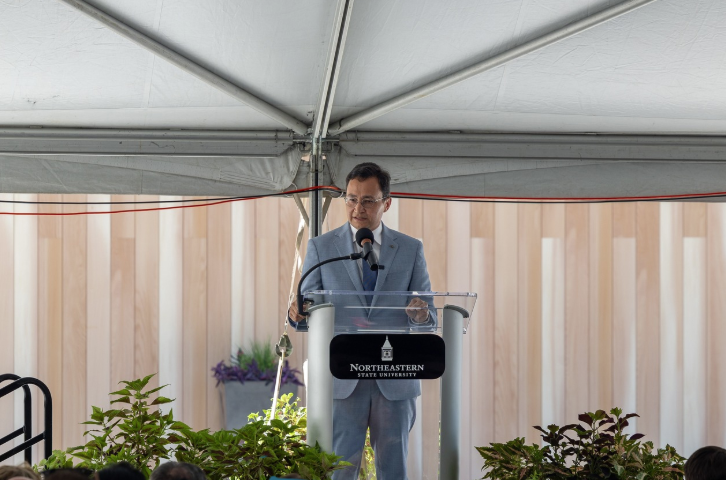
- Details
- By Chuck Hoskin Jr
Guest Opinion. For generations, the Cherokee Nation has prioritized education and worked to build partnerships that uplift our people and create a better future for Cherokee families and the communities we call home. One of the most enduring and important of those partnerships is with Northeastern State University. Together, our two entities, both based in Tahlequah in northeast Oklahoma, are writing a new chapter of shared progress.
The relationship between Cherokee Nation and NSU is more than symbolic: It is historic. Today’s modern NSU campus is on the site of Cherokee Nation’s female seminary, which was built in 1851 after our tribe’s forced removal to Indian Territory.
We have developed the blueprint for how a tribal government and a higher education institution can collaborate to improve access and opportunities for Cherokees, other Native students and communities within our 7,000-square-mile reservation. From creating a pathway for high school students to step seamlessly into college to investing in cutting-edge health care education, our combined efforts are preparing a new generation of leaders and professionals across many disciplines.

Recently, we celebrated the launch of a direct admission program to NSU for students at Sequoyah High School. Signed as an MOU with school leaders, this endeavor honors our commitment to higher education and removes some of the common barriers Native students face when they transition from high school to a university setting.
For many Cherokee youth, especially those who may not yet see a clear path forward to college or have access to quality mentorship and guidance, this program offers opportunity and a real sense of belonging. It says to them: College is not just a possibility, it’s part of your future, and we are here to help you get there.
We also improved access to academic resources and services for our citizens. A separate NSU agreement guarantees that Cherokee Nation citizens can access cultural and academic support services designed specifically for their success at NSU, whether they are entering as freshmen or returning to complete their degrees later in life.
That same forward-looking vision is reflected in the tribe’s investment in the new Oklahoma College of Optometry facility on the NSU campus. As the only optometry program in the country that places such an emphasis on serving tribal communities, it is the national model for how higher education and tribal health care systems can work hand in hand. Cherokee Nation’s support is vital for the facility that will train eye care professionals who will go on to serve Cherokees and our neighbors in rural Oklahoma.
Each one of the efforts is substantial and meaningful in their own right. Collectively, they represent a larger strategy to ensure Cherokees have the tools they need to succeed. When we invest in NSU and in the students who pass through its halls, we invest in the health, knowledge and leadership of our Nation.
Cherokee Nation and NSU share more than geography, we share a commitment to personal and community development. Acting as true partners, we can build a new legacy as we prepare our Cherokee youth for lives of purpose.
Chuck Hoskin, Jr. is the prnicipal chief of the Cherokee Nation.
More Stories Like This
Extending the Affordable Care Act Is a Moral Imperative for Indian CountryAll Is Fair in … War?
Why Federal Health Insurance Policy Matters to Cherokee Nation
The Absence of October's Job Report Shows Why Native American Communities Need Better Data
Tribal IDs Are Federally Recognized. ICE Agents Are Ignoring Them.
Help us defend tribal sovereignty.
At Native News Online, our mission is rooted in telling the stories that strengthen sovereignty and uplift Indigenous voices — not just at year’s end, but every single day.
Because of your generosity last year, we were able to keep our reporters on the ground in tribal communities, at national gatherings and in the halls of Congress — covering the issues that matter most to Indian Country: sovereignty, culture, education, health and economic opportunity.
That support sustained us through a tough year in 2025. Now, as we look to the year ahead, we need your help right now to ensure warrior journalism remains strong — reporting that defends tribal sovereignty, amplifies Native truth, and holds power accountable.
 The stakes couldn't be higher. Your support keeps Native voices heard, Native stories told and Native sovereignty defended.
The stakes couldn't be higher. Your support keeps Native voices heard, Native stories told and Native sovereignty defended.
Stand with Warrior Journalism today.
Levi Rickert (Potawatomi), Editor & Publisher

